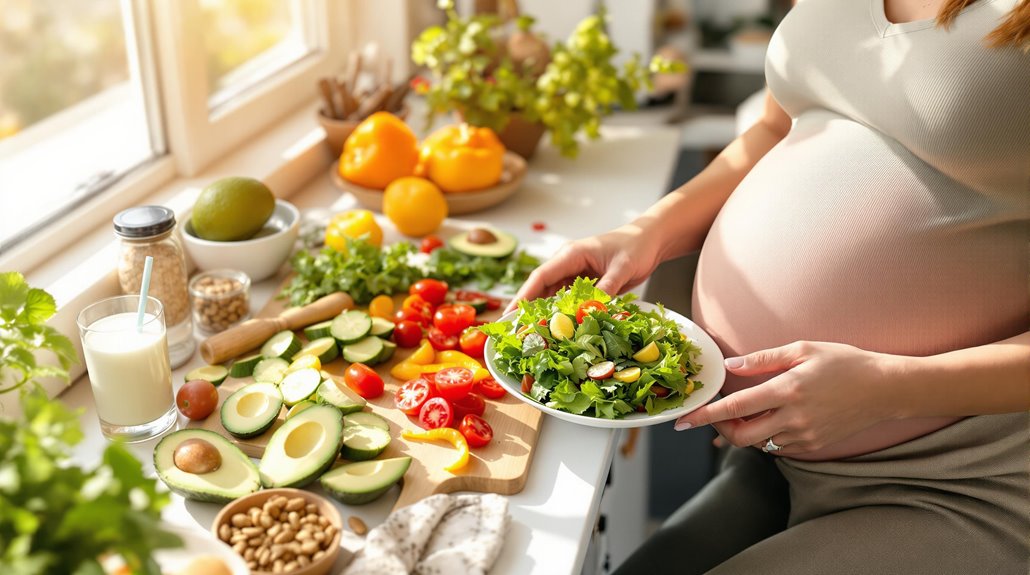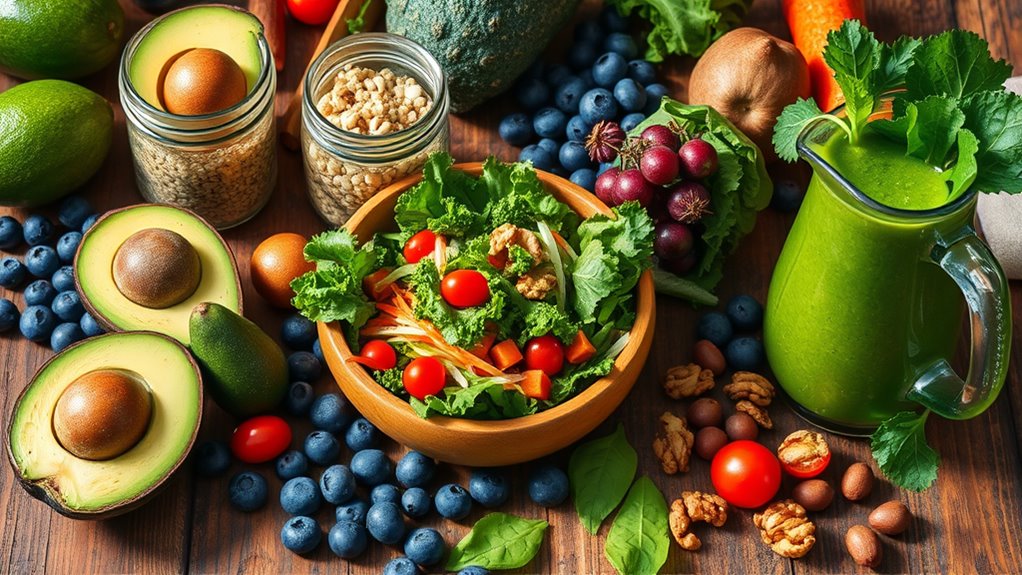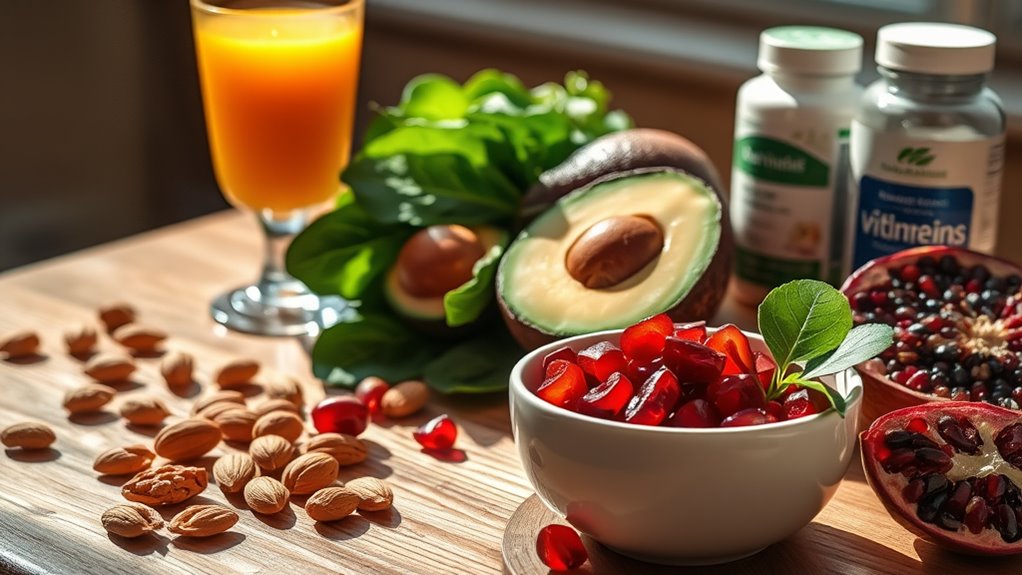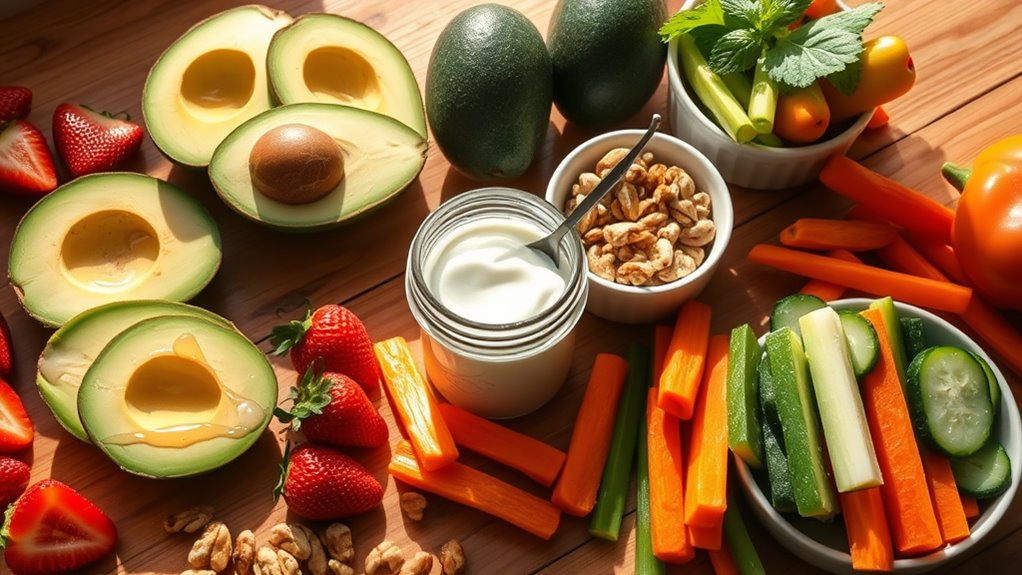
To eat healthily during pregnancy, focus on balancing your diet with essential nutrients. In the first trimester, emphasize nutrient-rich foods since extra calories aren’t necessary. As you progress, add 340 extra calories in the second trimester and 450 in the third to support your growing baby. Make sure to include vitamins like A, C, and D, and don’t skip prenatal vitamins for a boost. Choose nutrient-dense foods like lean meats, dairy, fruits, and vegetables. Stay hydrated by drinking 8-12 glasses of water daily. Also, avoid certain foods like high-mercury fish for safety. There’s more to discover about maintaining a balanced and nutritious diet.
Caloric Needs During Pregnancy
Understanding caloric needs during pregnancy is essential for a healthy gestation period. It’s not about eating for two, but embracing the notion that your body has unique, evolving requirements. Caloric calculations will guide you to nourish both you and your baby, empowering you to make informed choices.
During the first trimester, additional calories aren’t generally necessary if you’re at a normal weight. Focus on quality nutrients instead. A recent study published in *Science* indicates that the metabolic demands of a mother’s body during pregnancy are higher than previously thought, so it’s important to be mindful of your overall nutritional intake.
As you shift into the second trimester, your body requests 340 extra calories daily. This translates into liberating food choices like two glasses of skim milk and a hearty bowl of oatmeal. It’s vital for pregnant women to adhere to these guidelines to ensure optimal maternal and infant health.
In the third trimester, you’ll need about 450 extra calories each day—consider wholesome snacks like nuts, yogurt, and fresh fruit. These adjustments support your growing baby and energize your body.
For those carrying multiples, the caloric demands increase: 600 extra calories for twins, 900 for triplets. Embrace these variations as empowering steps towards a vibrant pregnancy.
Essential Nutrients to Focus On
Meeting your caloric needs is just the start; focusing on the right nutrients is key for a healthy pregnancy. Prioritize essential vitamins and minerals to support your baby’s growth and your well-being. Vitamin A keeps skin, eyesight, and bones healthy, with sources like carrots and sweet potatoes. Vitamin C supports your gums and bones—look to citrus fruits and strawberries for an easy nutritional boost. To enhance mineral absorption, make sure you get 600 international units of Vitamin D daily, vital for calcium absorption and strong bones. Enjoy fortified milk or fatty fish such as salmon. As a general guideline, maintaining healthy eating habits can ensure both you and your baby receive the nutrients necessary for a successful pregnancy. When expecting twins, higher nutrient and calorie intake is required to support the additional growth demands, increasing the importance of a well-balanced diet rich in vitamins and minerals.
Balancing these nutrients guarantees your body works efficiently, liberating you from nutrient deficiencies that could affect you and your child.
| Vitamin/Mineral | Key Sources |
|---|---|
| Vitamin B6 | Bananas, beef, whole grains |
| Vitamin B12 | Meat, milk, supplements (for vegetarians) |
| Calcium | Yogurt, sardines, dark leafy greens |
| Iron | Lean meats, dried beans, fortified cereals |
| Iodine | Iodized salt, seafood, eggs |
This diverse nutrient intake supports mineral absorption and helps you thrive. Remember, prenatal vitamins can fill any nutritional gaps, making sure you’re receiving sufficient folic acid, iron, calcium, and Vitamin D while you embrace your journey ahead.
Nutrient-Dense Food Choices

A balanced diet during pregnancy doesn’t just fill you up; it fuels your body and nurtures your growing baby. By making nutrient-dense food choices, you’ll empower yourself with the freedom to enjoy eating without guilt or restriction. Dairy products like milk and yogurt are significant for calcium and vitamins, ensuring strong bones for both you and your baby. If you’re going plant-based, opt for fortified alternatives. Nutrient timing is essential; start your day with options like calcium-fortified cereals paired with protein-rich eggs or lean meats such as chicken or lean beef, each brimming with unique benefits. To support brain development in your baby, incorporate foods rich in healthy fats, like avocados and nuts, into your diet. Incorporating starchy foods, which provide essential fiber, can help with digestion and curb unnecessary snacking during the day.
Protein variety is key, so explore fish like salmon for omega-3s or legumes like lentils for fiber and folate. Embrace a vibrant array of fruits and veggies—berries, citrus, and dark leafy greens deliver vitamins and antioxidants crucial for your pregnancy journey.
Don’t shy away from wholesome snacks; a handful of nuts and seeds, edamame, or a rejuvenating dip with cut veggies will energize you through the day.
Diversifying your food choices liberates your palate while safeguarding your health and your baby’s growth—an investment that will always pay off.
Foods to Avoid
During pregnancy, your diet’s vigilance is essential to ensuring your health and your baby’s safety. Embracing food safety isn’t just about what to eat; it’s also about recognizing foods to avoid. High-risk foods can jeopardize your well-being and that of your developing baby. Here’s a practical guide to help you make empowered choices:
- Beware of Unpasteurized and Raw Foods: Raw milk, unpasteurized cheeses, and juices carry bacteria risks. Forgo raw sprouts, raw eggs, and unwashed produce which can harbor harmful microorganisms.
- Say No to Certain Meats and Seafood: Raw or undercooked meats, deli meats unless steaming hot, and smoked seafood are off the table. Avoid fish high in mercury like shark and swordfish. Raw fish or shellfish, such as sushi and clams, should also be excluded due to the possibility of contamination. Drinking adequate hydration is essential during pregnancy, as it supports overall health and helps maintain proper body functions.
- Avoid Specific High-Risk Foods: Liver products can overly saturate you with vitamin A. Refrain from game meats that might contain lead, and steer clear of mould-ripened soft cheeses unless pasteurized.
- Follow General Food Safety Practices: Stay clear of alcohol, limit caffeine, and never forget to handle, cook, and store food properly.
Keep cold foods cold and hot foods hot to protect yourself and your baby.
Be mindful, be free, and keep your choices safe!
Prenatal Supplements

When it comes to guaranteeing a healthy pregnancy, understanding the role of prenatal supplements can make a significant difference. It’s not just about filling any nutritional gaps; it’s about the empowerment of knowing you’re setting the stage for a robust foundation.
Timing is everything when it comes to these supplements. Ideally, start taking them 1-3 months before conception to build up a reserve of essential nutrients. Even if you’re not actively trying to conceive, staying prepared with these vitamins could be a game changer.
Focus on supplements containing folic acid, calcium, iron, and vitamin D. Folic acid, with an intake of 400-600 mcg, helps prevent neural tube defects, while calcium supports bone health. Iron combats anemia, and vitamin D is crucial for calcium absorption. Consider omega-3 fatty acids (DHA) for your baby’s brain and eye development.
Adequate protein intake is also crucial during pregnancy for maintaining healthy muscle mass and metabolic balance.
Always verify ingredient safety by choosing products with third-party certifications, confirming their quality and effectiveness.
Liberate yourself from worries by consulting a healthcare provider who aligns with your values and lifestyle. Together, you can craft a plan that embraces both freedom and responsibility, letting you focus on your pregnancy journey with confidence.
Importance of Hydration
Staying well-hydrated during pregnancy plays an essential role in ensuring a healthy journey for both you and your baby. Your blood volume increases to transport important nutrients and oxygen to your growing baby, making hydration critical.
Water also forms the bulk of amniotic fluid, which is essential for your baby’s protection and growth. Digestion and nutrient absorption benefit from hydration, while it also helps regulate your body temperature, shielding you from overheating. Additionally, drinking enough water lowers the risk of urinary tract infections, a common concern during pregnancy.
Consider these tips and effects:
- Hydration Sources: Aim for 8-12 glasses of water daily, and include hydrating foods like watermelon and cucumbers.
- Dehydration Symptoms: Watch for headaches, dizziness, and constipation as signals that you’re not drinking enough.
- Risks of Dehydration: Understand that dehydration can lead to severe outcomes like preterm labor and low amniotic fluid levels.
- Staying Hydrated: Use water bottles, and infuse your water with fruits to make drinking more enjoyable.
Liberate yourself from worry by listening to your body’s cues. Keep hydration a priority, ensuring both you and your baby are nourished and protected throughout this remarkable journey.
Managing Caffeine and Alcohol

As you prioritize proper hydration, it’s equally important to pay attention to your caffeine and alcohol consumption during pregnancy. Embracing freedom means understanding the needs of your body and your baby’s growth. Caffeine is found in various sources such as coffee, tea, chocolate, energy drinks, and some medications. High levels of caffeine intake can lead to serious effects like an increased risk of miscarriage and low birth weight. Here’s a quick reference table to help manage caffeine intake:
| Caffeine Source | Approx. Caffeine Content |
|---|---|
| 8 oz Coffee | 95 mg |
| 8 oz Black Tea | 47 mg |
| 12 oz Energy Drink | 80 mg |
Consider that caffeine constricts blood vessels in the uterus and placenta, hampering fetal growth. With pregnant women being more sensitive to caffeine effects, even moderate intake could lead to jitters. Keep it under 200mg daily—about 1½ cups of coffee—and check labels for exact amounts. Embracing your journey means seeking balance and consulting healthcare providers for personalized advice. Meanwhile, steering clear of alcohol completely eliminates the risk of fetal alcohol spectrum disorders, liberating you to make informed choices for a healthy, fulfilling pregnancy.
Creating a Balanced Meal Plan
To guarantee a healthy and fulfilling pregnancy, focusing on creating a balanced meal plan is essential. By embracing food variety and meal prep, you can nourish both yourself and your growing baby.
Start by incorporating all essential food groups throughout your day. Fuel up with whole grains to boost energy, enjoy a medley of fresh and dried fruits, and savor a variety of vegetables, rich in vitamins and minerals. Don’t forget to round off your meals with servings of dairy and protein sources.
Here’s a simple plan to inspire you:
- Breakfast: Kickstart your day with oatmeal topped with fruits and nuts.
- Lunch: Relish a whole-wheat wrap stuffed with lean chicken, colorful veggies, and a side of yogurt.
- Dinner: Delight in a meal of grilled fish, quinoa, and steamed leafy greens.
- Hydration: Consuming 6-8 glasses of water daily keeps you refreshed and supports your energy levels.
Experiencing liberation in your pregnancy routine starts with conscious meal prep. This approach lets you enjoy a diverse range of foods without constraints.
Smart Snacking Tips

Even during pregnancy, smart snacking can play a pivotal role in ensuring both you and your baby get essential nutrients throughout the day. Embrace snack preparation as a liberating ritual, stocking up on whole foods like fruits, vegetables, and whole grains. This empowers you to seize control in a world that often pushes convenience over health.
Pair carb-rich snacks with proteins like nuts or Greek yogurt to maintain balanced energy and embrace mindful eating practices. By avoiding sugary treats and opting for nutrient-dense alternatives, you create a nourishing environment for your developing baby.
Prepare snack options in advance to support spontaneous cravings with health-conscious choices. Keep a variety of fruits, nuts, and whole grain crackers on hand. Choose portable snacks like trail mix or energy balls to free yourself from the traditional confines of three meals a day.
Divide your meals into smaller, frequent snacks to prevent nausea and stabilize blood sugar levels. Hydrate with water to enhance digestion and combat constipation.
This approach not only supports healthy weight gain and fetal growth but also fuels your own sense of liberation, allowing you to embrace the limitless possibilities of pregnancy nutrition.
Boost Baby’s Development Naturally
Throughout pregnancy, maintaining a well-rounded, nutrient-rich diet is essential for the healthy development of the baby and the well-being of the mother. A thorough understanding of the essential nutrients and their roles helps to better support this important time.
Folic acid is critical for preventing neural tube defects and is a foundational component in the early stages of fetal brain and spine development. Iron supports the creation of red blood cells and guarantees optimal delivery of oxygen to the fetus, thereby aiding in preventing maternal anemia and promoting a healthy birth weight. Additionally, choline is significant for brain development and cognitive function, making it an indispensable part of prenatal nutrition.
Including a variety of fortified foods and supplements can greatly enhance a child’s developmental prospects. With guidance on the consumption of specific food groups, such as seafood, pregnant women can confirm that their diet contributes effectively to fetal brain development while avoiding harmful substances.
The delicate balance between obtaining enough choline from foods like eggs and soy products while steering clear of high-mercury seafood requires attention but can yield considerable cognitive benefits for the child. Understanding these essential elements allows expectant mothers to take proactive steps—naturally boosting their baby’s development through informed and nutritious food choices.














